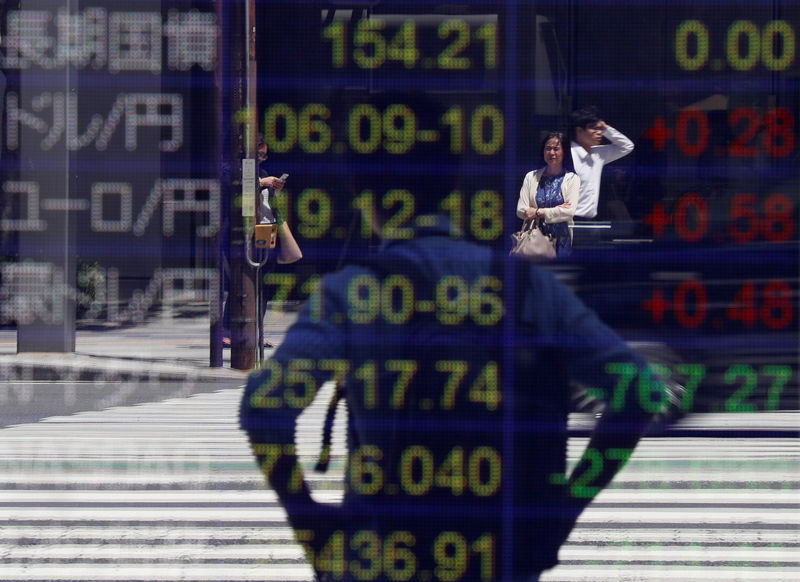By Shinichi Saoshiro
TOKYO (Reuters) - Global stocks extended already substantial losses on Tuesday, after Washington tagged China a currency manipulator, shaking fragile investor sentiment in a rapid escalation of the U.S.-China trade war.
Safe-haven assets, including bonds and some currencies such as the yen and Swiss franc, benefited as investors scurried to avoid risk.
In early European trade, the pan-region Euro Stoxx 50 futures (STXEc1) were down 0.2%, German DAX futures (FDXc1) slipped 0.15% and Britain's FTSE futures (FFIc1) lost 0.4%.
U.S. Treasury Secretary Steven Mnuchin said on Monday the government had determined that China is manipulating its currency, and that Washington would engage the International Monetary Fund to eliminate unfair competition from Beijing.
"Officially labelling China a currency manipulator gives the United States a legitimate reason to take even more steps," said Norihiro Fujito, senior investment strategist at Mitsubishi UFJ Morgan Stanley (NYSE:MS) Securities.
"The markets are now scrambling to factor in the possibility of the United States imposing not only an additional 10% of tariffs on Chinese imports, but the figure being raised to 25%. This is likely to be a protracted trade war without a quick resolution."
U.S. President Donald Trump vowed last week to impose a 10% tariff on $300 billion of Chinese imports from Sept. 1, adding that it can be raised beyond 25%. Some economists reckon the global economy could slip into recession in the coming months if the tariff is increased to 25%.
The Trump administration's dramatic move against China hastened the risk aversion seen in global markets this week. On Monday, China let the yuan slide in response to the latest U.S. tariffs, which are expected to further aggravate trade tensions between the world's two largest economies.
MSCI's broadest index of Asia-Pacific shares outside Japan (MIAPJ0000PUS) was down 0.75% after brushing its lowest since January. It has lost 3.7% so far this week.
The Shanghai Composite Index (SSEC) retreated 1.4%.
Japan's Nikkei (N225) shed 0.7%, Australian stocks (AXJO) fell 2.3% and South Korea's KOSPI (KS11) slid 0.9%.
"Hedge funds and other speculators who have bet on stocks have not finished closing down their positions yet. There will likely be another wave of selling in stocks," said Masanori Takada, cross asset strategist at Nomura Securities.
"The sudden surge in volatility is likely to prompt risk parity players to pull out possibly up to $20 billion from global stocks and buy bonds."
YUAN'S SLIDE STALLS
The onshore Chinese yuan
In a symbolic move, Beijing let the yuan breach 7-per-dollar on Monday for the first time since late 2008. But the Chinese central bank's mid-point fixing on Tuesday of 6.9683 was firmer than market expectations, and the yuan's retreat slowed.
(For a graphic on 'Onshore Chinese yuan', click https://tmsnrt.rs/2MFqXZS)
China's offshore yuan stretched the previous day's slide, and briefly weakened to 7.1382
The Japanese yen, a perceived safe-haven in times of market turmoil and political tensions, touched a seven-month high of 105.520 per dollar
The Swiss franc, another currency sought in times of turmoil, has gained roughly 1% against the dollar this week. It set a six-week peak of 0.9700 franc per dollar
Investor demand for other safe-havens such government bonds also remained high as risk aversion gathered momentum.
The 10-year U.S. Treasury yield (US10YT=RR) extended sharp falls overnight and declined to 1.672%, its lowest since October 2016.
(For a graphic on 'World stocks and US 10-year yield', click https://tmsnrt.rs/2MHiXYj)
Japan's 10-year yield
Brent crude oil futures (LCOc1) plumbed a seven-month low of $59.07 per barrel as the trade war raised concerns about lower demand for commodities. Brent last traded at $60.41 for a gain of 1% as bargain hunting kicked in. [O/R]

Spot gold